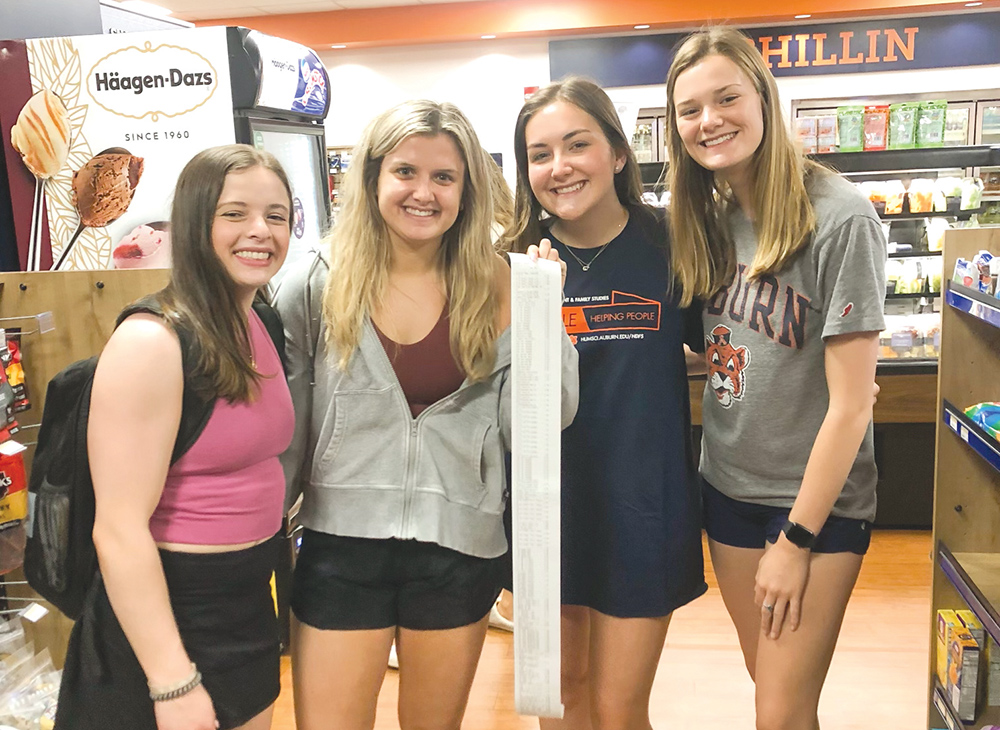BY HANNAH LESTER
HLESTER@
OPELIKAOBSERVER.COM
AUBURN —
Auburn University students are partnering with community members, grocery stores and their friends to find ways to help children in need over the summer.
The Summer Sustenance Project at Auburn University was born from students in Caroline Payne-Purvis’ class in the Department of Human Development and Family Studies in The College of Human Sciences.
Students in Payne-Purvis’ class last fall were learning about child development and the ways in which food insecurity can affect a child’s school performance.
“We were talking a lot about the importance of nutrition within child development, family stress and education in general and how when children are not fed consistently, they don’t know where their next meal’s coming from, maybe they’re only receiving their food from school, they don’t sleep, they can’t study, they’re not doing well in school, they’re misbehaving and oftentimes, these are the kids that are held back,” Payne-Purvis said. “Not because actually they can’t perform academically, but they can’t perform because they’re hungry.”
The students in Payne-Purvis’ class began to question what would happen for local children over Thanksgiving break when they couldn’t receive food at school.
They took up a collection to send food home with children over the break.
“I reached out to the counselor at Cary Woods, simply because that’s where my daughter goes to school and where I had a connection, and she was able to help us support families over Thanksgiving at Cary Woods,” she said.
The project, at the behest of Payne-Purvis’ students, was then completed again over Christmas and Spring breaks.
“The students well-exceeded my expectations,” she said. “I will say, I have yet to spend more than like $50 total on any of this. It’s not me, it’s the students. They’re bringing in food. They’re bringing in [food] from their pantry, they’re packing it. All I’m really doing is providing the opportunity. The students are really doing it.
“From Spring Break, we had a student, Emma Chumley, reach out and say, ‘Can we do it for summer?’ And she said, ‘I’ll head it up.’ I said, ‘We can try.’”
Providing food to children in need over the summer months is a longer, and more arduous process. And it requires a lot more donations — both monetary and physical.
“I have a ton of students coming back to Auburn to help with this, simply because they want to,” Payne-Purvis said. “There’s no class credit, there’s no extra credit, there’s nothing.”
Elementary school students’ parents can opt their children into the program. It is designed specifically for students who already receive food from the schools on the weekends.
There will be three opportunities for parents to pick up food — end of May, end of June and end of July at Benchmark Physical Therapy by the Cary Creek Publix.
“We’re hoping we’re close to having the amount [of food] we need for the May pickup, just from student donations,” Payne-Purvis said.
Students have held benefit nights with local businesses, like Momma Goldberg’s to raise funds and food.
Almost 450 children have signed up to receive meals, Payne-Purvis said. And if it costs $5 a day for breakfast, lunch and snacks, the project needs more funds to cover the summer.
If businesses or community members want to donate, or volunteer their time, they can email Payne-Purvis at cmpurvis@auburn.edu. Donations are accepted online at https://givebutter.com/aYjICY and there is a volunteer signup at https://m.signupgenius.com/#!/showSignUp/904054DACA623A4FC1-summer.
There are food donation boxes at both the Benchmark Physical Therapy locations (Cary Creek and South College) and Ridgeway Diagnostics on Samford.
All donations are being matched by a donor, Payne-Purvis said.
“One thing I’d love for [the community] to realize is if they give $5, realize that that’s actually $10,” she said.
Her main concern with the project is a whole is not having enough food for the children, she said. The type of food they’re buying is a lot like a college student’s diet, Payne-Purvis joked.
“College students and elementary school kids eat about the same thing,” she said. “It’s fantastic. It’s the perfect partnership.”
Macaroni and cheese, peanut butter crackers, trail mix, cereal, oatmeal, etc., are all examples of snacks and food collected.
“[This project] has been one of the most rewarding things I’ve done in teaching in almost 13 years,” Payne-Purvis said.
Payne-Purvis said she’s watched her students not only understand the problem with food insecurity and behavioral and emotional problems but want to find a solution.
“As a whole, [my students] have more than likely not experienced food insecurities themselves,” she said. “So that being said, they’re relating to a population that isn’t them and they’re reaching out and wanting to help them. And to me, it’s just that they’re simply getting it. They’re understanding what Human Development and Family Studies is all about.”
